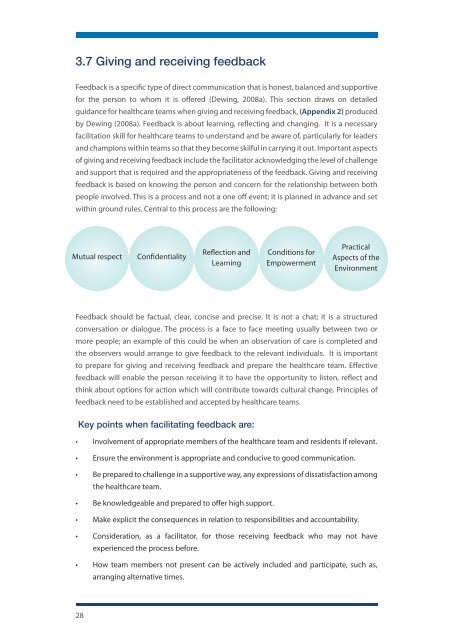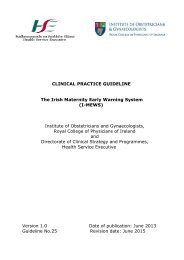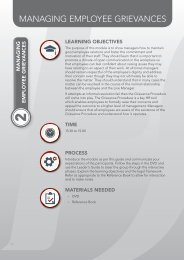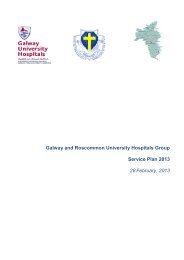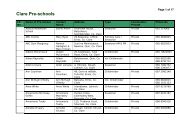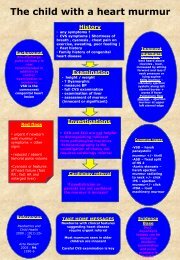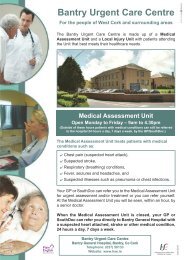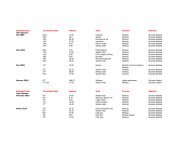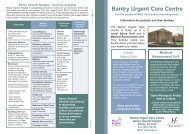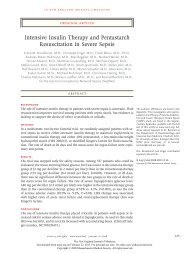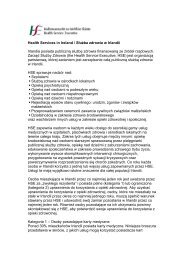Enhancing Care for Older People - Health Service Executive
Enhancing Care for Older People - Health Service Executive
Enhancing Care for Older People - Health Service Executive
Create successful ePaper yourself
Turn your PDF publications into a flip-book with our unique Google optimized e-Paper software.
3.7 Giving and receiving feedback<br />
Feedback is a specific type of direct communication that is honest, balanced and supportive<br />
<strong>for</strong> the person to whom it is offered (Dewing, 2008a). This section draws on detailed<br />
guidance <strong>for</strong> healthcare teams when giving and receiving feedback, (Appendix 2) produced<br />
by Dewing (2008a). Feedback is about learning, reflecting and changing. It is a necessary<br />
facilitation skill <strong>for</strong> healthcare teams to understand and be aware of, particularly <strong>for</strong> leaders<br />
and champions within teams so that they become skilful in carrying it out. Important aspects<br />
of giving and receiving feedback include the facilitator acknowledging the level of challenge<br />
and support that is required and the appropriateness of the feedback. Giving and receiving<br />
feedback is based on knowing the person and concern <strong>for</strong> the relationship between both<br />
people involved. This is a process and not a one off event; it is planned in advance and set<br />
within ground rules. Central to this process are the following:<br />
Mutual respect Confidentiality<br />
Feedback should be factual, clear, concise and precise. It is not a chat; it is a structured<br />
conversation or dialogue. The process is a face to face meeting usually between two or<br />
more people; an example of this could be when an observation of care is completed and<br />
the observers would arrange to give feedback to the relevant individuals. It is important<br />
to prepare <strong>for</strong> giving and receiving feedback and prepare the healthcare team. Effective<br />
feedback will enable the person receiving it to have the opportunity to listen, reflect and<br />
think about options <strong>for</strong> action which will contribute towards cultural change. Principles of<br />
feedback need to be established and accepted by healthcare teams.<br />
Key points when facilitating feedback are:<br />
• Involvement of appropriate members of the healthcare team and residents if relevant.<br />
• Ensure the environment is appropriate and conducive to good communication.<br />
• Be prepared to challenge in a supportive way, any expressions of dissatisfaction among<br />
the healthcare team.<br />
• Be knowledgeable and prepared to offer high support.<br />
• Make explicit the consequences in relation to responsibilities and accountability.<br />
• Consideration, as a facilitator, <strong>for</strong> those receiving feedback who may not have<br />
experienced the process be<strong>for</strong>e.<br />
• How team members not present can be actively included and participate, such as,<br />
arranging alternative times.<br />
28<br />
Reflection and<br />
Learning<br />
Conditions <strong>for</strong><br />
Empowerment<br />
Practical<br />
Aspects of the<br />
Environment


